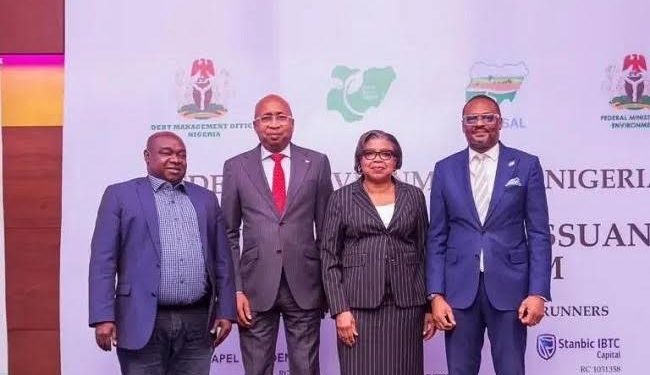The federal government, through the Debt Management Office (DMO), has announced the issuance of its third Sovereign Green Bond, seeking to raise up to ₦50 billion to finance key environmental and infrastructure initiatives across the country.
The bond offering, which opened on Monday, June 16 and is scheduled to close by Wednesday, June 18, 2025, is a major component of Nigeria’s climate finance strategy. It aims to position the country as a leader in environmental sustainability on the continent, according to the DMO’s Director General, Patience Oniha.
“This Green Bond supports the government’s environmental efforts and climate change commitments,” Oniha said at the launch. “It is part of a global agenda for environmental stewardship, and Nigeria is taking consistent steps to do more.”
The Series III Green Bond, co-arranged by Chapel Hill Denham Advisory Limited and Stanbic IBTC Capital Limited, is structured as a fixed-rate, five-year tenor note backed by the full faith and credit of the Federal Government of Nigeria. It qualifies as a liquid asset for financial institutions, making it attractive to banks and institutional investors seeking exposure to sustainable investments.
The latest issuance builds on the success of the first two green bonds issued in 2017 and 2019, which were both oversubscribed. Those proceeds supported projects in renewable energy, afforestation, agriculture, and clean transport.
According to the investor presentation, the funds raised from the new bond will be allocated across several priority areas:
* ₦15.96 billion for climate change adaptation and mitigation projects under the Federal Ministry of Environment
* ₦15 billion for clean energy initiatives, particularly the Presidential CNG Initiative, supporting electric vehicle infrastructure and local gas conversion projects
* ₦16.4 billion for water infrastructure development, including the construction of new earth dams and rehabilitation of vital water supply systems
The Director of the Department of Climate Change at the Ministry of Environment, Dr. Iniobong Awe, highlighted Nigeria’s broader climate goals, which include a commitment to reducing emissions by 47 percent under the Paris Agreement. This consists of a 20 percent unconditional and 45 percent conditional target. He noted ongoing policies and projects under Nigeria’s 2021–2030 climate plan, such as the Energising Education Project and the Bus Rapid Transit (BRT) mass transit project, as examples of active mitigation and adaptation efforts.
Following the offer’s close, allotment results will be announced on June 20, while the bond is set to be listed on both the Nigerian Exchange Limited (NGX) Sustainable Instruments Market and the FMDQ Green Exchange by July 7. The dual listing is expected to enhance transparency, liquidity, and visibility for investors interested in certified green assets.
The urgency of Nigeria’s green transition was reinforced by data presented at the launch, which placed the country 140th out of 180 on the Environmental Performance Index, underscoring the critical need for sustainable financing solutions to address the nation’s environmental challenges.










